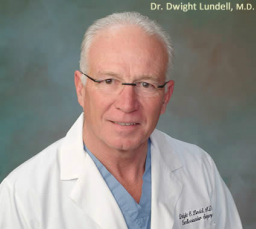
ok get this into your head; almost all you've heard about fats in books, magazines, TV, dietetic associations, heart associations, and school is WRONG. Just ask Dr Dwight Lundell, heart surgeon, who like 99.9% of American and Canadian Dr.'s believed the propaganda for over 20 years. Until he did something rare; he looked at the research and evidence with an open mind. Now he says things that are good and true, but also blasphemous to the Canadian and American heart associations, dietetic associations, and mainstream media; he says things like;
- low fat diets are retarded
- vegetable oils are killing us
- blood cholesterol doesn't matter
- healthy whole saturated fats are good for us!
now are all these veggie oil margarine loving butter fearing associations stupid? I won't judge, but I do know they are ALL bankrolled by the veggie oil and sugar loving food industry. Becel pays off everyone lol, more than the Mob.
- low fat diets are retarded
- vegetable oils are killing us
- blood cholesterol doesn't matter
- healthy whole saturated fats are good for us!
now are all these veggie oil margarine loving butter fearing associations stupid? I won't judge, but I do know they are ALL bankrolled by the veggie oil and sugar loving food industry. Becel pays off everyone lol, more than the Mob.
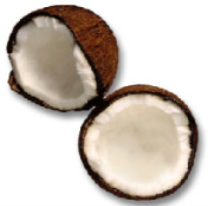
Fats that you Need and ones that you Don't
A healthy diet is generous in fats. Low fat diets for most people are a big mistake. The only people who do well on low fat diets are people who are mostly of the Kapha Ayurvedic bodytype. These people are a minority, so for most of us, a medium to high fat diet is the best for leanness and health!
Safe, healthy fats are:
virgin Olive oil (or extra virgin) - in any grocery store
avoid mad crazy specials in the world of olive oil - there is a lot of fake olive oil out there, that has been 'cut' with junk refined oils- buyer beware! olive oil is mostly made of monounsaturated fats which are fairly stable, which is good; don't fry with olive though, because saturated fats are far more stable and more frying-appropriate. Olive oil is also high in a very special fat, rare in other sources, called squalene, which has a host of skin and immune system benefits. Drizzle it on your food; eat greasy, like the Greeks and Italians and Portuguese .. and pretty much all of southern Europe.
Hemp seed oil (in health stores)
Hemp oil contains GLA, an important omega 6 fat, and LNA, an omega 3 fat. Hemp oil is the most perfect fat supplement. It is quite polyunsaturated, so the bulk of my fat would better come from more stable fats, like olive, palm, or coconut. Please read on about coconut and palm oils; they are proven to be very healthy for humans, even if they do not contribute to the American and Canadian refined seed oil industries!
Coconut oil is rich in certain saturated fats called medium chain triglycerides (MCT's) which stimulate fat metabolism, and lower cholesterol. Please note that saturated fats are vastly different from each other, depending partly on chain length. Long chain saturates (as found in much animal fat), tend to modestly raise serum cholesterol, while the medium chain and short chain fats actually lower it. Epidemiological research shows us that people suffer more cardiovascular morbidity and higher serum cholesterol levels as they either move away from areas where coconut oil is consumed regularly, or they adopt western dietary habits, including the use of the common polyunsaturated vegetable oils. See the research, at the bottom of this article.
A healthy diet is generous in fats. Low fat diets for most people are a big mistake. The only people who do well on low fat diets are people who are mostly of the Kapha Ayurvedic bodytype. These people are a minority, so for most of us, a medium to high fat diet is the best for leanness and health!
Safe, healthy fats are:
virgin Olive oil (or extra virgin) - in any grocery store
avoid mad crazy specials in the world of olive oil - there is a lot of fake olive oil out there, that has been 'cut' with junk refined oils- buyer beware! olive oil is mostly made of monounsaturated fats which are fairly stable, which is good; don't fry with olive though, because saturated fats are far more stable and more frying-appropriate. Olive oil is also high in a very special fat, rare in other sources, called squalene, which has a host of skin and immune system benefits. Drizzle it on your food; eat greasy, like the Greeks and Italians and Portuguese .. and pretty much all of southern Europe.
Hemp seed oil (in health stores)
Hemp oil contains GLA, an important omega 6 fat, and LNA, an omega 3 fat. Hemp oil is the most perfect fat supplement. It is quite polyunsaturated, so the bulk of my fat would better come from more stable fats, like olive, palm, or coconut. Please read on about coconut and palm oils; they are proven to be very healthy for humans, even if they do not contribute to the American and Canadian refined seed oil industries!
Coconut oil is rich in certain saturated fats called medium chain triglycerides (MCT's) which stimulate fat metabolism, and lower cholesterol. Please note that saturated fats are vastly different from each other, depending partly on chain length. Long chain saturates (as found in much animal fat), tend to modestly raise serum cholesterol, while the medium chain and short chain fats actually lower it. Epidemiological research shows us that people suffer more cardiovascular morbidity and higher serum cholesterol levels as they either move away from areas where coconut oil is consumed regularly, or they adopt western dietary habits, including the use of the common polyunsaturated vegetable oils. See the research, at the bottom of this article.
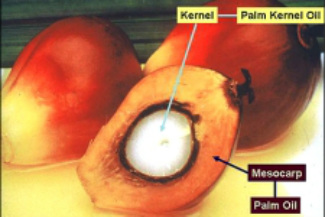
Palm oil (in health stores, as well as African and Caribbean stores) is another good heart healthy fat. Palm oil is the second most consumed vegetable fat worldwide. Imagine the opportunities if it were demonized! Underdeveloped countries think that over-processed vegetable oils are healthier, and they are abandoning their traditional, healthy oils in droves! Such a crying shame ...
Palm oil is reddish orange, because it's chock-full of alpha-carotene, which is a stronger antioxidant than beta carotene. It is also rich in tocotrienols, which are a rarely found supremely healthy type of vitamin E.
virgin Avocado oil and avocados are good, in any quantity. They are mostly monounsaturated, and safe in small or large amounts.
virgin Almond oil from brands like Omega, Orphee and Soleil d'Or are good. Almond oil is also mostly heart-healthy monounsaturated.
other virgin oils, in moderate quantities; Walnut, Sesame, and Safflower. Remember polyunsaturates are inherently unstable, and need to make up a minority of the oils in your diet; never a majority.
organic Butter is fantastic! A source of vitamin A and D and K, and other minor healthy components. Full of short chain and long chain saturates, which have a healthy stabilising effect on our cells. Organic is important because animal fats are quite contaminated when they are from commercially fed and treated animals. Help yourself, the cows and the planet, go organic! More organic info found on my Organic eating page.
Palm oil is reddish orange, because it's chock-full of alpha-carotene, which is a stronger antioxidant than beta carotene. It is also rich in tocotrienols, which are a rarely found supremely healthy type of vitamin E.
virgin Avocado oil and avocados are good, in any quantity. They are mostly monounsaturated, and safe in small or large amounts.
virgin Almond oil from brands like Omega, Orphee and Soleil d'Or are good. Almond oil is also mostly heart-healthy monounsaturated.
other virgin oils, in moderate quantities; Walnut, Sesame, and Safflower. Remember polyunsaturates are inherently unstable, and need to make up a minority of the oils in your diet; never a majority.
organic Butter is fantastic! A source of vitamin A and D and K, and other minor healthy components. Full of short chain and long chain saturates, which have a healthy stabilising effect on our cells. Organic is important because animal fats are quite contaminated when they are from commercially fed and treated animals. Help yourself, the cows and the planet, go organic! More organic info found on my Organic eating page.
Omega 3 fats
Also discussed in the heart page of this site, omega 3 fats are (very) essential for human health. The base fat that all other omega 3's can be made of is called LNA, linolenic acid. Not to be confused with linoleic acid, which is omega 6.
From the base (or parent fat) called LNA, we get EPA and DHA, eicosapentanoic and docosahexanoic acid, respectively. Particularly in fish, whales, and seals there is a high amount of EPA and DHA already formed.
I focus on taking the parent fat, LNA from sage seed. It is remarkably more stable than flax. In fact, flax oil is so unstable that it quickly becomes oxidised shellac, when applied to wood. My father is very experienced in woodwork and has found flax to cure quite quickly, without even being boiled first. Because flax so readily degrades, I would never consume flax oil. Flax meal on the other hand has been tested and shown to be much more stable. For me, flax meal is out too, because it is quite estrogenic. A female nutritionist told me that consuming flax meal regularly caused her breasts to grow quite noticeably, which she was happy about. For men, I wouldn't recommend anything strongly estrogenic ever. Women on the other hand may benefit from such plants as flax and hops who's effects may help their female health.
Fish oils are a disaster zone; most, literally 90% or more are hot processed. Many brands actually brag about being "molecularly distilled". Problem is, distilling fish oil involves high heat, usually 180°C or so. Consequently, there is conflicting evidence of benefit since much of the available fish oil is wrecked, and therefore bad for our health.
The only two fish oils I whole heartedly recommend are Rosita cod liver oil, and anything by the Green Pastures brand, the latter being widely available in Canada and the USA. Personally I take NatureSage omega 3 oil. It's not readily available in North America, but on my shop page I mention how to get some.
Omega 3 fats are important for fat metabolism, cellular function in the whole body, blood sugar control, anti-inflammation, and brain, eye and heart support.
Also discussed in the heart page of this site, omega 3 fats are (very) essential for human health. The base fat that all other omega 3's can be made of is called LNA, linolenic acid. Not to be confused with linoleic acid, which is omega 6.
From the base (or parent fat) called LNA, we get EPA and DHA, eicosapentanoic and docosahexanoic acid, respectively. Particularly in fish, whales, and seals there is a high amount of EPA and DHA already formed.
I focus on taking the parent fat, LNA from sage seed. It is remarkably more stable than flax. In fact, flax oil is so unstable that it quickly becomes oxidised shellac, when applied to wood. My father is very experienced in woodwork and has found flax to cure quite quickly, without even being boiled first. Because flax so readily degrades, I would never consume flax oil. Flax meal on the other hand has been tested and shown to be much more stable. For me, flax meal is out too, because it is quite estrogenic. A female nutritionist told me that consuming flax meal regularly caused her breasts to grow quite noticeably, which she was happy about. For men, I wouldn't recommend anything strongly estrogenic ever. Women on the other hand may benefit from such plants as flax and hops who's effects may help their female health.
Fish oils are a disaster zone; most, literally 90% or more are hot processed. Many brands actually brag about being "molecularly distilled". Problem is, distilling fish oil involves high heat, usually 180°C or so. Consequently, there is conflicting evidence of benefit since much of the available fish oil is wrecked, and therefore bad for our health.
The only two fish oils I whole heartedly recommend are Rosita cod liver oil, and anything by the Green Pastures brand, the latter being widely available in Canada and the USA. Personally I take NatureSage omega 3 oil. It's not readily available in North America, but on my shop page I mention how to get some.
Omega 3 fats are important for fat metabolism, cellular function in the whole body, blood sugar control, anti-inflammation, and brain, eye and heart support.
 steak 'n eggs yummy :-p
steak 'n eggs yummy :-p
CHOLESTEROL does not cause Heart Disease!
Cholesterol is good for you! It is so important for your body that your body makes it plentifully, in order for you to have healthy red blood cells that are flexible and also healthy cell membranes, for all your cells. Men and women make all their sex hormones from cholesterol. A low cholesterol diet is killer; the USA has steadily decreased their fat and cholesterol intake over the past 40 years, and have gotten FATTER with NO DECREASE in heart disease. Of course, because they eat too many bad carbs and not enough healthy fats.
Most heart disease is caused by margarine and rancid veggie oils, and too much bad carbs, as well as chronic shortages of vitamin C and magnesium. Heart disease is almost non existent in most animals because they make their own vitamin C in their bodies; thousands of milligrams. Read on about heart health on the heart health page.
A Greek client of mine had high cholesterol and was told by his doctor to eat less eggs and cheese. Having a healthy distrust, he proceeded to eat MORE eggs and cheese, and upon redoing a blood test a few months later, his cholesterol DROPPED. I would guess because eating more protein and fat tends to drop cholesterol levels in the blood, due to reductions in insulin which reduces cholesterol production in the body. See aneggadayisok.ca In fact I think any amount of eggs a day is ok, as long as you have variety in your diet. I personally rotate my foods to reduce allergenicity. See my rotation chapter of my E book or search the net for more about a rotation diet.
How to Lower your blood cholesterol
NOT that it really matters, since taken together, homocysteine and C-reactive protein and triglycerides in the blood are far more important (see the Heart page on my site for how to lower all three). But if your Dr is on your back about high cholesterol and thinks taking a toxic killer drug like Crestor, Lipitoo, or a statin is a good idea, here's how you lower your cholesterol;
- vit C 1000 mg twice a day will lower LDL
- coconut cream coconut oil, in generous amounts will definitely lower cholesterol and help your heart in other ways
- eat more beans and nuts and seeds
- exercise - especially some squats (even at home, youtube how to do them not to hurt your knees) - 50 squats daily would be great
- drink more water. Dr Batmanghelidj found clients easily lowered their cholesterol from drinking more water even with no other dietary changes!
Unlike cholesterol lowering drugs, the above methods are all good for you. Don't be a statistic; just say no to drugs. It is YOUR body, so don't let anyone push drugs on you; not your neighbourhood drug dealer and not our medical system.
Cholesterol is good for you! It is so important for your body that your body makes it plentifully, in order for you to have healthy red blood cells that are flexible and also healthy cell membranes, for all your cells. Men and women make all their sex hormones from cholesterol. A low cholesterol diet is killer; the USA has steadily decreased their fat and cholesterol intake over the past 40 years, and have gotten FATTER with NO DECREASE in heart disease. Of course, because they eat too many bad carbs and not enough healthy fats.
Most heart disease is caused by margarine and rancid veggie oils, and too much bad carbs, as well as chronic shortages of vitamin C and magnesium. Heart disease is almost non existent in most animals because they make their own vitamin C in their bodies; thousands of milligrams. Read on about heart health on the heart health page.
A Greek client of mine had high cholesterol and was told by his doctor to eat less eggs and cheese. Having a healthy distrust, he proceeded to eat MORE eggs and cheese, and upon redoing a blood test a few months later, his cholesterol DROPPED. I would guess because eating more protein and fat tends to drop cholesterol levels in the blood, due to reductions in insulin which reduces cholesterol production in the body. See aneggadayisok.ca In fact I think any amount of eggs a day is ok, as long as you have variety in your diet. I personally rotate my foods to reduce allergenicity. See my rotation chapter of my E book or search the net for more about a rotation diet.
How to Lower your blood cholesterol
NOT that it really matters, since taken together, homocysteine and C-reactive protein and triglycerides in the blood are far more important (see the Heart page on my site for how to lower all three). But if your Dr is on your back about high cholesterol and thinks taking a toxic killer drug like Crestor, Lipitoo, or a statin is a good idea, here's how you lower your cholesterol;
- vit C 1000 mg twice a day will lower LDL
- coconut cream coconut oil, in generous amounts will definitely lower cholesterol and help your heart in other ways
- eat more beans and nuts and seeds
- exercise - especially some squats (even at home, youtube how to do them not to hurt your knees) - 50 squats daily would be great
- drink more water. Dr Batmanghelidj found clients easily lowered their cholesterol from drinking more water even with no other dietary changes!
Unlike cholesterol lowering drugs, the above methods are all good for you. Don't be a statistic; just say no to drugs. It is YOUR body, so don't let anyone push drugs on you; not your neighbourhood drug dealer and not our medical system.
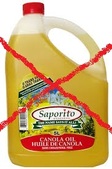
Now for the Bad Fats
Vegetable oils SUCK
They really do!
Canola, sunflower, grapeseed, corn, soy, mustard seed oil and all other common vegetable oils are very unstable and half ruined before you even cook with them, and DANGEROUS.
The truth is that canola and other vegetable oils are to blame for promoting diabetes, obesity, and heart disease.
The healthiest fats for anyone, including those with heart problems are clearly outlined above; virgin olive oil, coconut oil, palm oil, and small amounts of hemp oil. Fish oil is excellent, as a supplement to the diet, by no means being taken in excess of 5-10g per day. People with heart problems especially should read this article, and show any health practitioner the research cited here, if they are ever told to eat margarine, or corn oil, or canola oil; the worst garbage of all!
Canola is hybridized from rapeseed oil. It is a new fat in the human diet. It is not at all proven in long term research to be safe for us. We have thousands of years' history consuming olive oil, and many hundreds, if not thousands, consuming palm and coconut oils. The Wall Street Journal reported that workers frying with rapeseed oil were found to have excessive rates of lung cancer, which appears to point to danger from inhalation of this junk oil. Wall Street Journal, June 7, 1995, p. B6.
The standard deodorization process that ALL ‘vegetable oils’ undergo can result in the formation of trans fatty acids! Although our government claims the trans content of canola is around 0.2 percent, it is usually much more.
Lab research has found trans levels as high as 4.6 percent in off the shelf canola oil!
S. O'Keefe et al, “Levels of Trans Geometrical Isomers of Essential Fatty Acids in Some Unhydrogenated US Vegetable Oils.” Journal of Food Lipids 1994;1:165-176.
Canola is one export that we have given the world that no Canadian should be proud of. Do not believe the hype, and stay as far from canola (scam-ola) as you can.
Vegetable oils SUCK
They really do!
Canola, sunflower, grapeseed, corn, soy, mustard seed oil and all other common vegetable oils are very unstable and half ruined before you even cook with them, and DANGEROUS.
The truth is that canola and other vegetable oils are to blame for promoting diabetes, obesity, and heart disease.
The healthiest fats for anyone, including those with heart problems are clearly outlined above; virgin olive oil, coconut oil, palm oil, and small amounts of hemp oil. Fish oil is excellent, as a supplement to the diet, by no means being taken in excess of 5-10g per day. People with heart problems especially should read this article, and show any health practitioner the research cited here, if they are ever told to eat margarine, or corn oil, or canola oil; the worst garbage of all!
Canola is hybridized from rapeseed oil. It is a new fat in the human diet. It is not at all proven in long term research to be safe for us. We have thousands of years' history consuming olive oil, and many hundreds, if not thousands, consuming palm and coconut oils. The Wall Street Journal reported that workers frying with rapeseed oil were found to have excessive rates of lung cancer, which appears to point to danger from inhalation of this junk oil. Wall Street Journal, June 7, 1995, p. B6.
The standard deodorization process that ALL ‘vegetable oils’ undergo can result in the formation of trans fatty acids! Although our government claims the trans content of canola is around 0.2 percent, it is usually much more.
Lab research has found trans levels as high as 4.6 percent in off the shelf canola oil!
S. O'Keefe et al, “Levels of Trans Geometrical Isomers of Essential Fatty Acids in Some Unhydrogenated US Vegetable Oils.” Journal of Food Lipids 1994;1:165-176.
Canola is one export that we have given the world that no Canadian should be proud of. Do not believe the hype, and stay as far from canola (scam-ola) as you can.
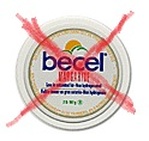
Trans Fats are really bad!
A well known, formerly suppressed toxic fact. Now, 50 (if not 80) years later, the news is out on trans fats. Much new research that is inconvenient never sees the light of day in terms of our compromised education and media systems. Trans fats are still abundant in most fast food; anything fried, especially, like doughnuts, KFC, french fries, corn chips, potato chips and even in margarine. Especially margarine which claims to be trans fat free. Do not believe it.
Margarine SUCKS- all types!!
A consumer group in Sweden examined the levels of PAH, or polyaromatic hydrocarbons, in Becel margarine, which is marketed as an especially healthy margarine, since it is not hydrogenated. They found levels which were well over legal limits for these toxic residues. The legal limit for toxic PAH's in any oil is 5ppm. Becel weighed in at 53.9ppm! That is over ten times over, but who is checking? PAH's are strange fats, far worse for us than trans fats! That is why their levels are strictly legislated (but not enforced- sadly- not a unique scenario in our food supply at all- refer to Dr. S. Chopra's excellent book on Health Canada called "Rotten to the Core"- he was fired from Health Canada for trying to protect Canadians' health, and foiling some (very) big companies!)
-reference; Swedish Consumer Coalition (2003), [open letter to the Swedish National Food Administration] Retrieved March 1, 2005, from
The Swedish Consumer Coalition
The regular processing that our vegetable oils are subjected to creates toxic byproducts, like PAH, as well as the predictable oxidised polyunsaturates. In common language, we would call oxidised and polymerised fats rancid, but the bleaching and deodorising process can mask off, rancid flavours. Oxidised fats are well known to be preferentially incorporated into atherosclerotic placque. By the way, Becel was found to contain trans fat, contrary to their lying claims, according to research published in the Asia Pacific Journal of Clinical Nutrition (1993) 2, pp 155-163.
more FAT References
Enig, M.G., Fallon, S., The Oiling of America. from The Weston A. Price Foundation © 1999 Mary G. Enig, PhD and Sally Fallon. First published in Nexus Magazine, Dec '98-Jan '99 and Feb '99-Mar '99.
Berger, K. G., (1995) La guerre des huiles: opinions et nutrition. Plantations, Recherche, Développement, 2, (5): 22-27 Retrieved english translation March 1, 2005 from Medline Website: http://www.ncbi.nlm.nih.gov/entrez/query.fcgi?
Nevin KG, Rajamohan T. Beneficial effects of virgin coconut oil on lipid parameters and in vitro LDL oxidation. Clinical Biochemistry. 2004;37(9):830-5
Edem, D. O. (2002) Palm oil: biochemical, physiological, nutritional, hematological, and toxicological aspects: a review. Plant Foods for Human Nutrition, 57, (3/4): 319-341
Mann, J. I. (1996) A South Pacific Perspective on Diet and Cardiovascular Disease. Proceedings of the Nutrition Society of New Zealand, 21: 1-8
Jessup, W. Kritharides, L. Stocker, R. (2004) Lipid oxidation in Atherogenesis: an Overview. Biochemical Society Transactions, 32, (1): 134-138
Edem, D. O. (2002) Palm oil: biochemical, physiological, nutritional, hematological, and toxicological aspects: a review. Plant Foods for Human Nutrition, 57, (3/4): 319-341
A well known, formerly suppressed toxic fact. Now, 50 (if not 80) years later, the news is out on trans fats. Much new research that is inconvenient never sees the light of day in terms of our compromised education and media systems. Trans fats are still abundant in most fast food; anything fried, especially, like doughnuts, KFC, french fries, corn chips, potato chips and even in margarine. Especially margarine which claims to be trans fat free. Do not believe it.
Margarine SUCKS- all types!!
A consumer group in Sweden examined the levels of PAH, or polyaromatic hydrocarbons, in Becel margarine, which is marketed as an especially healthy margarine, since it is not hydrogenated. They found levels which were well over legal limits for these toxic residues. The legal limit for toxic PAH's in any oil is 5ppm. Becel weighed in at 53.9ppm! That is over ten times over, but who is checking? PAH's are strange fats, far worse for us than trans fats! That is why their levels are strictly legislated (but not enforced- sadly- not a unique scenario in our food supply at all- refer to Dr. S. Chopra's excellent book on Health Canada called "Rotten to the Core"- he was fired from Health Canada for trying to protect Canadians' health, and foiling some (very) big companies!)
-reference; Swedish Consumer Coalition (2003), [open letter to the Swedish National Food Administration] Retrieved March 1, 2005, from
The Swedish Consumer Coalition
The regular processing that our vegetable oils are subjected to creates toxic byproducts, like PAH, as well as the predictable oxidised polyunsaturates. In common language, we would call oxidised and polymerised fats rancid, but the bleaching and deodorising process can mask off, rancid flavours. Oxidised fats are well known to be preferentially incorporated into atherosclerotic placque. By the way, Becel was found to contain trans fat, contrary to their lying claims, according to research published in the Asia Pacific Journal of Clinical Nutrition (1993) 2, pp 155-163.
more FAT References
Enig, M.G., Fallon, S., The Oiling of America. from The Weston A. Price Foundation © 1999 Mary G. Enig, PhD and Sally Fallon. First published in Nexus Magazine, Dec '98-Jan '99 and Feb '99-Mar '99.
Berger, K. G., (1995) La guerre des huiles: opinions et nutrition. Plantations, Recherche, Développement, 2, (5): 22-27 Retrieved english translation March 1, 2005 from Medline Website: http://www.ncbi.nlm.nih.gov/entrez/query.fcgi?
Nevin KG, Rajamohan T. Beneficial effects of virgin coconut oil on lipid parameters and in vitro LDL oxidation. Clinical Biochemistry. 2004;37(9):830-5
Edem, D. O. (2002) Palm oil: biochemical, physiological, nutritional, hematological, and toxicological aspects: a review. Plant Foods for Human Nutrition, 57, (3/4): 319-341
Mann, J. I. (1996) A South Pacific Perspective on Diet and Cardiovascular Disease. Proceedings of the Nutrition Society of New Zealand, 21: 1-8
Jessup, W. Kritharides, L. Stocker, R. (2004) Lipid oxidation in Atherogenesis: an Overview. Biochemical Society Transactions, 32, (1): 134-138
Edem, D. O. (2002) Palm oil: biochemical, physiological, nutritional, hematological, and toxicological aspects: a review. Plant Foods for Human Nutrition, 57, (3/4): 319-341
